|
|
|
|
|
|
|
Bartholomeos
demands equal rights Ankara -
Turkish Daily News
|
|
|
Greek Orthodox Patriarch Bartholomeos stated in an interview with Athens News that he has made the reopening of his alma mater, the Halki Theological Seminary, pictured above, a personal mission Bartholomeos was introduced by the newspaper as one of the most outspoken proponents of a Greek-Turkish friendship. In the exclusive interview, the highest-ranking leader of the world's 300 million Orthodox Christians called upon Turkey to live up to its own constitution, as well as basic human rights and values, in the key areas of religious freedom and minority rights as it undertakes its arduous journey to become a full-fledged member of the European Union. The newspaper claimed that Ankara's half-century campaign to gradually eliminate the Greek minority of Istanbul, and to decimate the once overwhelmingly Greek population of Imros has been overwhelmingly successful. It began with the orchestrated anti-Greek riots of Sept. 6-7, 1955, where the widespread plundering and looting of Greek businesses and homes in Istanbul established a terrifying chill in the Greek community, over 100,000-strong in the first half of the 20th century and now down to fewer than 4,000. Forty years later, Ankara abolished Greek-language education, expropriated for a pittance the lands of the overwhelmingly agricultural Greek population, and systematically transferred prison convicts to the island. Bartholomeos, an Imriot by birth, believes something can and should still be done to rectify past injustices. As for the many prime properties of the Greek community in Istanbul, the government continues to discriminate by arbitrarily dissolving the boards of trustees of the charitable foundations that own them, and casting a chill on the now tiny community. According to Bartholomeos, the issue of Halki is an essential one for the Ecumenical Patriarchate: "It is not simply a luxury, as some might think, but a matter of necessity for the renewal of the clergy at our ecclesiastical centre, here at the Phanar, of the communities in our city and of the eparchal dioceses of the patriarchal throne abroad. That includes Crete and the Dodecanese islands, western Europe and other parts of the world, where the last graduates of Halki are still actively ministering. "Certainly, after the passing of 31 years, the graduates of Halki -- whether they be bishops, clergy of lower rank or lay theologians who are professors -- are slowly but surely dwindling, and the patriarchate must have the ability to renew its ranks by training new theologians and clergy, who will be the standard bearers of its ecumenical spirit, and staff the centre of the Phanar and the eparchies abroad," said Bartholomeos. Bartholomeos continued, saying: "We want the school to operate again just as it did until 1971. Since it will operate on Turkish soil, there will be some supervision from the [Turkish] education ministry. This does not disturb us in the least, because we have nothing to hide. The school used to be run in a manner that was transparent, far from politics, and under the umbrella protection and financial support of the Ecumenical Patriarchate. "We had both clergy and lay professors. So we want to return to that regime, which in no way harms Turkey. On the contrary, Turkey will benefit from the reopening of such a school, because it will demonstrate to the whole world that there is indeed freedom of religion. It will show that the rights of minorities are respected. One will see that just as Muslim Turkish citizens can have their twenty-odd theological schools throughout the country to train those who undertake a religious mission, so too the Christians who live here and have the same citizenship, will be able to educate their clergy." Claiming that Turkey discriminates against minorities, Bartholomeos said that: "In a democratic country, it is under no circumstances permissible to discriminate against a certain segment of the population. According to the constitution of Turkey, there is an equal application of the law and of the rights of citizens. Turkish citizens, regardless of their religious beliefs and of ethnic background and the language they speak, as long as they have the Turkish citizenship, are equal before the law. This equality, however, applies not only to their duties before the state, but also to their rights. This is not what is going on today. There is discrimination against minorities. "With us Greeks who are Orthodox, there is discrimination relating to property rights and educational issues. There is a different status for minority charitable foundations and another for Muslim ones. In a democratic country, there must be equality. The Ecumenical Patriarchate is forbidden from buying a piece of real estate in its name because it lacks the legal status."
|
|
|
action@hec.greece.org
|



